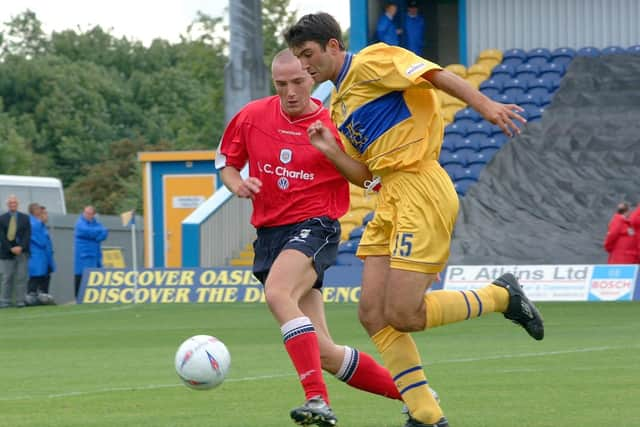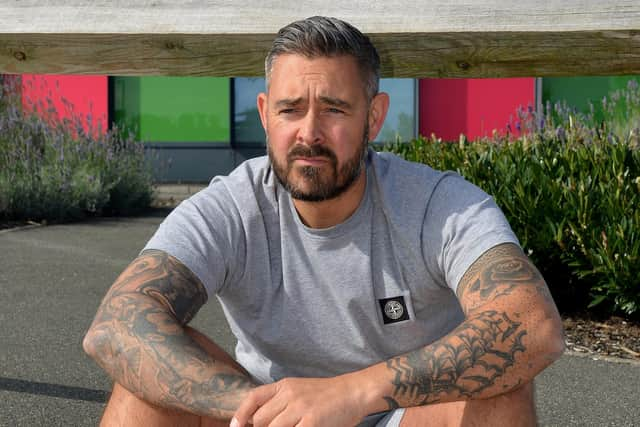'You feel like a burden' - Mansfield men speak out about their mental health struggles
This article contains affiliate links. We may earn a small commission on items purchased through this article, but that does not affect our editorial judgement.
and live on Freeview channel 276
With mental health struggles on the rise during the pandemic, we have spoken to Mansfield men to discuss their experiences.
Andy White played for Mansfield Town FC until 2004 but first noticed his mental health struggles in 2016.
Advertisement
Hide AdAdvertisement
Hide AdHe left his office job working for the NHS and applied to join the fire service, but soon began to notice anxiety beginning to impact his work.


The 38-year-old explains: “I started my fire service training in the September but I was struggling, over-thinking everything and had no appetite despite the physical work.”
Andy began losing weight, finding each week harder to cope.
He continued: “My first piece of advice is to speak to someone – I discussed my feelings with my course leader, who referred me to an occupational therapist.
“I bumbled through the rest of the training, but became overwhelmed with negative thoughts that I was the worst firefighter to have ever taken the course – despite reassurances from my trainers.”


Advertisement
Hide AdAdvertisement
Hide AdAndy explains: “I eventually went to my GP, he was great, I felt better offloading to someone who I knew wouldn’t judge me.
“On reflection, I had neglected my mental health for some time – I’ve never been the most confident, even with my football.
“I doubted myself – I was waiting for that tap on the shoulder to say ‘come on, enough is enough, it’s over’.
"The coaches, my teammates and fans were telling me different, but it didn’t matter – I’ve since read that this is called ‘imposter syndrome’.”


Advertisement
Hide AdAdvertisement
Hide AdAlthough he had made his mind up that the fire service was not right for him, he managed to complete the course.
He continued: “It was the final week and the recruits who had passed were taken to a specialist training facility, but on day two I broke down.
“I had pushed my mental health to its limits and it came crashing down.
“I woke up and couldn’t stop shaking, I was convinced everyone was whispering about me - the paranoia was indescribable.”
Advertisement
Hide AdAdvertisement
Hide AdHis father collected him from the camp and he began the road to recovery.
Andy eventually returned to his role within the NHS and continued with therapy, describing his recovery as ‘long and tough’.
He admits: "There were days where sleep was my sanctuary and at times I prayed that I wouldn’t wake up.
“If I was to pass on any advice to anyone in this situation now, I would say don’t listen to those voices, it’s the illness speaking.
Advertisement
Hide AdAdvertisement
Hide Ad"Listen to your friends and family and believe things will get better.
“I look back at my time in the fire service fondly as it helped me to be the person I am today, but don’t be afraid to make changes.
“I am now the happiest I’ve ever been – the support received from my friends, family and employers have helped me to get to this stage, and it can be the same for anyone reading this.”
Neil McKie from Mansfield Woodhouse was keen to speak out about his experiences after first noticing something was wrong in 2015.
Advertisement
Hide AdAdvertisement
Hide AdThe 44-year-old explains: “I started off feeling really emotional – I could be driving to work and suddenly burst into tears for no reason.
"I couldn’t work out what was wrong and it wasn’t really something that was spoken about then, especially by men.”
Neil eventually visited his GP after nine months of low mood and was given a diagnosis of depression, which he initially rejected.
He continues: “I didn’t think I was depressed, I thought people got depression when something bad happened to them, whereas I had everything going for me.
Advertisement
Hide AdAdvertisement
Hide Ad“The doctor explained that was the main misconception around mental health, and that it can be down to a chemical imbalance too.”
He was prescribed medication but couldn’t shake the stigma associated with taking tablets and declined.
He also describes feeling like ‘a bit of a fraud’ as he thought the mental health team was just for those feeling suicidal or suffering much more than he was, and stopped attending appointments.
The death of his beloved dog Jock, however, triggered another episode a year later.
Advertisement
Hide AdAdvertisement
Hide AdThis time his low mood didn’t lift as the months passed, and it was the first time he remembers feeling suicidal – he knew he had to seek help again.
He accepted the offer of counselling and expected them to delve into his childhood to find ‘a reason’ for his depression.
He admits: "I couldn’t have been more wrong.
"Yes they asked questions, but they were there to work out how to make me feel better, and it really helped.”
Neil now speaks more openly to his friends and family about his feelings and has also managed to recognise when his friends have also needed support, and is appealing to people to speak to a professional if they feel unable to speak to family.
Advertisement
Hide AdAdvertisement
Hide Ad"I get it, you feel like a burden, but recognising the problem and taking control is the first step – it’s nothing to be ashamed of.”
Charlotte Mather is a clinical hypnotherapist and life coach who helps many patients to change their mindset to combat anxiety and depression.
She explains: “My first recommendation is to interrupt the pattern of negative thoughts by asking themselves a question - self-coaching if you like.
"Ask yourself questions like ‘what emotion did I experience’, ‘what were the facts’, and ‘what could you do differently to avoid this feeling’?
"By doing this we can reprogram our mindset.”
Advertisement
Hide AdAdvertisement
Hide AdFor more information on the help she can offer, check out Charlotte’s website.
The Samaritans offer a free confidential service for anyone struggling with their mental health.
They are available 24 hours a day, 365 days a year by calling 116 123.